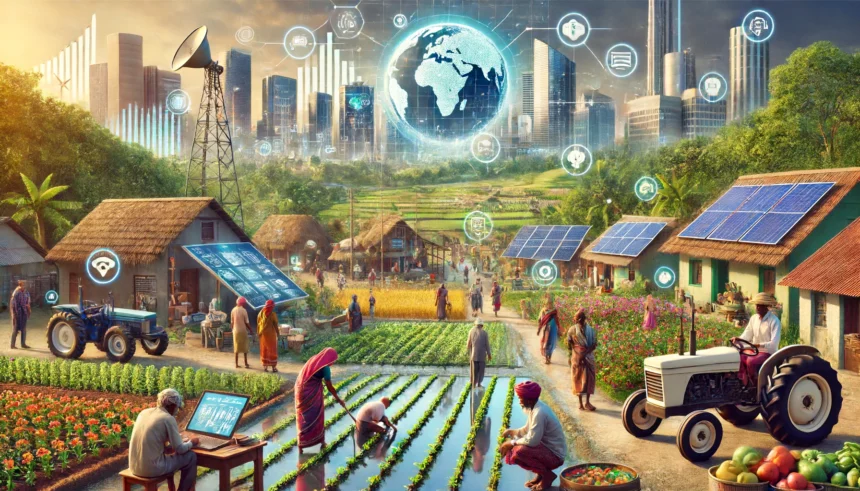Digital solutions have immense potential to boost global economic development and resilience. From AI and machine learning to smartphones and drones, these technologies are transforming how businesses operate and provide access to information and services worldwide. However, low- and middle-income countries (LMICs) face unique challenges in adopting these innovations. RTI is assisting these countries in navigating these complexities to leverage the benefits of digital solutions effectively.
Let’s explore four key areas where digital solutions are making a significant impact in LMICs, promoting sustainable and resilient development.
Transitioning to Clean Energy with Digital Solutions
Digital technologies are pivotal in helping countries shift from fossil fuels to renewable energy sources. Here’s how:
- AI for Energy Assessment: Utilities are using AI to evaluate the reliability and costs of different energy sources.
- Optimizing Electrical Grids: Digital tools manage electrical grids more effectively, especially when power comes from variable sources like solar and wind.
- Consumer Tools: Families use digital tools to monitor electricity usage and make payments conveniently.
Case Study: Solar Mini-Grids in Uganda In Uganda, solar mini-grids are providing affordable, reliable electricity to communities not connected to the national grid. In Somalia, we’re exploring mixed-technology mini-grids that combine batteries, diesel, and digital platforms for optimized management and cost reduction.
Enhancing Agricultural Resilience Through Digitalization
Digital tools are revolutionizing agriculture by helping producers make better decisions. Here’s what’s happening:
- Mobile Platforms for Farmers: Farmers can access weather forecasts, pest diagnostics, and other vital information via cell phones.
- Data-Driven Insights: In Rwanda, RTI researchers use drones and satellite images to monitor crop health and growth, combining this with climate models to enhance resilience.
Case Study: Financing in Senegal In Senegal, digital solutions have fostered trust among partners and banks, significantly increasing financing for irrigated-rice production from $8 million in 2015 to $19 million in 2018. Platforms like WhatsApp are also used to share critical agricultural information through text, video, and audio messages.
Expanding Trade with Digital Technology
Digital solutions streamline trade by digitizing customs processes, logistics, and payments, enhancing transparency and efficiency. Key innovations include:
- AI for Translation and Trend Tracking: AI tools translate information and track purchasing trends in real time.
- Automated Licensing and Certification: Simplifying and streamlining export operations.
Case Study: Rwandan Agricultural Exports Through the Feed the Future Rwanda Kungahara Wagura Amasoko project, we’re working with Rwanda’s National Agricultural Export Board to develop an online system for exporter licensing and certification. This has helped businesses like Aubin Produce International, a youth-owned organic honey export company, grow by using IT-based traceability tools.
Promoting Inclusive Growth with Digital Tools
Digital technologies and e-commerce expand economic opportunities for women and marginalized groups by supporting remote and in-home employment. They also help develop new skill sets necessary for the growing green sector. Here’s how:
- IT Sector Development: Countries are building their IT sectors, offering courses in data science, computer skills, and basic English.
- Youth Workforce Education: Digital platforms are increasingly used for educating the youth workforce.
Case Study: Rwanda’s Digital Inclusion In Rwanda, the Feed the Future Hanga Akazi activity is building digital skills among the workforce, including training a cooperative of persons with disabilities in digital inclusion, enabling them to compete better in the market.
Overcoming Barriers to Digital Adoption in LMICs
Despite the clear benefits, LMICs face challenges in adopting digital solutions. These include outdated policies, high investment costs, and issues related to data privacy and security. Additionally, many LMICs lack reliable internet access, which is crucial for implementing advanced digital technologies.
RTI is leveraging its expertise in data science, AI, and international development to help LMICs identify suitable digital solutions, understand adoption requirements, and create supportive policy environments. By doing so, we are turning potential into progress, fostering green growth and resilience in these regions.
Conclusion
Digital solutions are not just about technology; they’re about creating sustainable, resilient communities. By addressing the unique challenges of LMICs and leveraging digital innovations, we can drive significant progress in clean energy, agriculture, trade, and inclusive growth. The future is digital, and with the right support, LMICs can harness this potential for a brighter, more resilient tomorrow.















